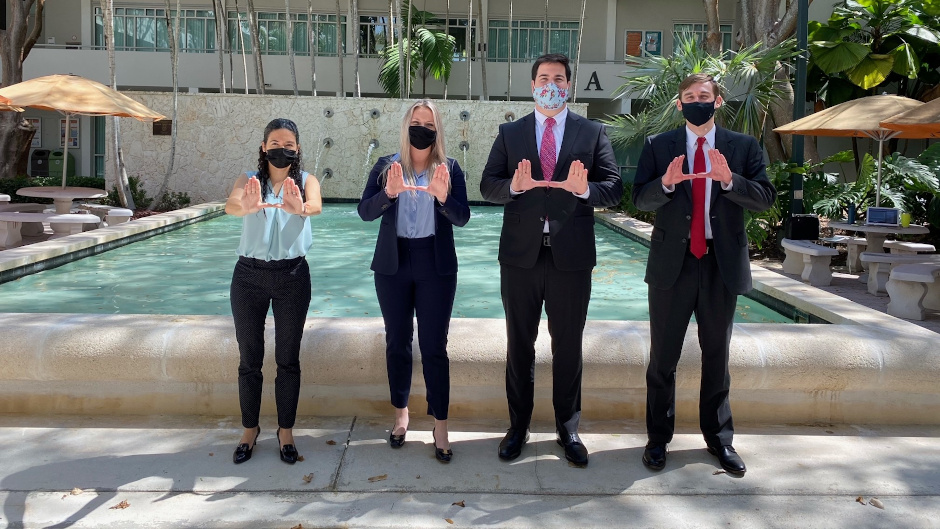Miami Law’s International Moot Court team recently competed in the virtual oral rounds of the 2020-2021 International and European Tax Moot Competition, the largest and most prestigious in the legal field of transnational taxation. Students Rachel Ruffalo, 3L/Tax LL.M., Matthew Slootsky, 3L/Tax LL.M., and Andrew Graykowski, 2L, made it to the final round, achieving the highest overall score in their oral pleadings and the second highest-ranking overall. They were coached by Paula Arias, director of the International Moot Court Program and lecturer at law.
“Competing two years in a row was an experience I’ll never be able to forget,” said Slootsky. “Last year when everything was abruptly halted, it was extremely disappointing but being able to finish the job and continue to work with ‘Profe’ and the team, including Andrew this time, made everything worth it and extremely rewarding.”
Also known simply as “KU Leuven”— after its organizer, the Katholieke Universiteit Leuven of Belgium — the moot competition poses complex and often topical cases involving tax disputes in a European and/or international context. In addition to its dense and complicated subject matter, the moot has a well-earned reputation for exclusivity and rigor - only 24 teams are selected from around the world to participate, based partly on past performance and global academic rankings. Based on the strength of their written memorials, just 16 moved to the oral rounds. Miami Law was ultimately one of only two teams to make it past the first and second of these qualifying rounds.
Miami Law’s tax team was well suited for the task. During the winter break, the students wrote two memoranda, one on behalf of the taxpayer and one on behalf of the tax authorities. The team was notified in late January that their briefs received high enough marks to qualify for the oral rounds. Under the guidance of Arias, the team practiced their oral arguments every week — often into the night and through the weekend — to improve their oral advocacy skills and coordination.
“I am extremely proud to be a part of this team,” said Graykowski. “The level of effort, teamwork and training exceeded all of my expectations. In this competition, we were faced with two incredibly challenging problems, one in the initial rounds and another in the finals. The problems required a lot of research and a deep understanding of complex matters, which I had very limited experience in. I owe Matthew and Rachel a lot because they taught me so much and were incredible teammates throughout the entire process. Additionally, our team's performance was due in large part to Professor Arias. She molded us into professional advocates in a matter of months.”
In addition to the continued challenges of adapting to an online-only format, this year’s competition was especially difficult.
“The case dealt with a very novel issue," said Arias. “Together we had to navigate international tax issues derived from hybrid financial instruments and conflict of qualifications. It covered a topic that is much debated in international and comparative tax law.”
To top it off, once the team advanced to the final round, they received a completely new problem to argue. In 24 hours, the students needed to understand the new case and facts, design a strategy and arguments, write a brief, and prepare oral arguments for the final round. Such intensity warrants the involvement and sponsorship of several leading global tax and accounting firms, including KMPG and PWC.
“Being able to participate in IMC and the Tax Moot Court Competition the past two years has been intense yet beyond rewarding,” said Ruffalo. “I was able to learn so much about international tax treaties, as I had no experience with international tax beforehand. The experience of being on IMC and the tax team was the most fulfilling experience I have undertaken in law school, and I am beyond grateful.”
The final round took place before three seated judges specializing in tax law, including a Supreme Court justice from the Netherlands who served as president of the competition’s tribunal. Under this immense pressure, the team shinned and came away with both recognition and a set of skills that will serve them a lifetime.
“The most unexpected part of this whole experience was how fun and rewarding it was,” said Graykowski. “I believe this comes from our team's chemistry, Professor Arias' dedication to improving our skills, and from the nature of the KU Leuven competition. The fact that we were on a stage with some of the top students from all over the world was daunting and exciting. This has been an experience I will remember for the rest of my life.”
Read more about Miami Law’s International Moot Court Program

